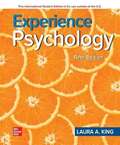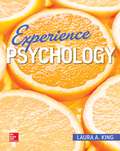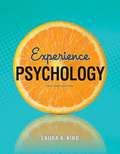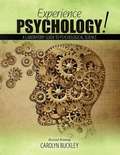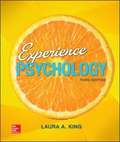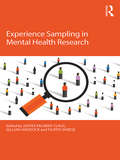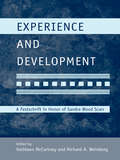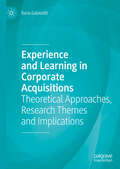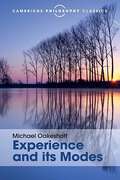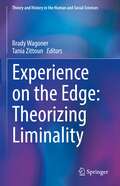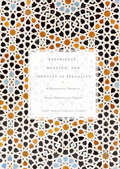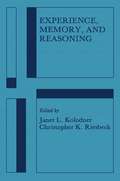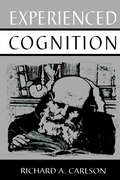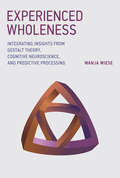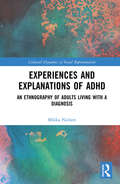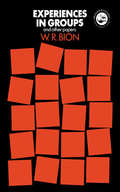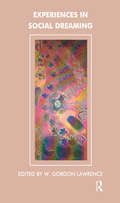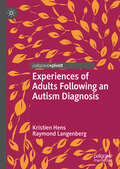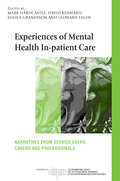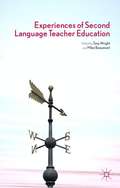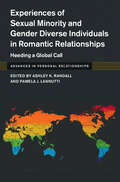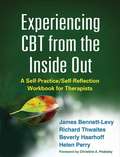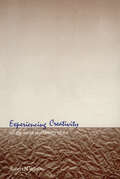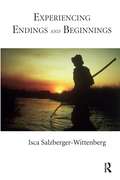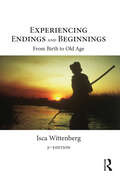- Table View
- List View
Experience Psychology
by Laura A. KingExperience Psychology helps students understand and appreciate psychology as an integrated whole. The personalized, adaptive learning program, thought-provoking examples, and interactive assessments help students see psychology in the world around them and experience it in everyday life. Experience Psychology is about, well, experience--our own behaviors; our relationships at home and in our com munities, in school, and at work; and our interactions in different learning environments. Grounded in meaningful real-world contexts, Experience Psychology's contemporary examples, personalized author notes, and applied exercises speak directly to students, allowing them to engage with psychology and to learn verbally, visually, and experientially--by reading, seeing, and doing. Function is introduced before dysfunction, building student understanding by looking first at typical, everyday behavior before delving into the less common--and likely less personally experienced--rare and abnormal behavior. Experience Psychology places the science of psychology, and the research that helps students see the academic foundations of the discipline, at the forefront of the course. With Experience Psychology, students do not just "take" psychology but actively experience it.
Experience Psychology
by Laura KingSome students take psychology...others experience it! Informed by student data, Experience Psychology helps students understand and appreciate psychology as an integrated whole. The personalized, adaptive learning program, thought-provoking examples, and interactive assessments help students see psychology in the world around them and experience it in everyday life.
Experience Psychology (Second Edition)
by Laura KingDo you want your students to just take psychology or to experience psychology? Experience Psychology is a complete learning system that empowers students to personally, critically, and actively experience the impact of psychology in everyday life. Experience Psychology is about, well, experience--our own behaviors; our relationships at home and in our communities, in school and at work; and our interactions in different learning environments. Grounded in meaningful real-world contexts, Experience Psychology's contemporary examples, personalized author notes, and applied exercises speak directly to students, allowing them to engage with psychology and to learn verbally, visually, and experientially--by reading, seeing, and doing. With the Experience Psychology learning system, students do not just "take" psychology but actively experience it.
Experience Psychology! A Laboratory Guide To Psychological Science
by Carolyn BuckleyPsychology Laboratory Manual: A Hands-On Introduction to Psychological Science
Experience Psychology, 3rd Edition
by Laura A. KingSome students take psychology. . . others experience it! Informed by student data, Experience Psychology helps students understand and appreciate psychology as an integrated whole. The personalized, adaptive learning program, thought-provoking examples, and interactive assessments help students see psychology in the world around them and experience it in everyday life.
Experience Sampling in Mental Health Research
by Jasper Palmier-Claus Gillian Haddock Filippo VareseExperience Sampling in Mental Health Research provides comprehensive and user-friendly guidance on when and how to apply this methodology in the assessment of clinical populations. Divided into three sections, the book offers step-by-step instruction on how to design, develop and implement an ESM study, as well as advice on how this approach might be adapted for common mental health difficulties. With an eye to the future of this type of research, the contributors also consider how ESM might be adapted for use as a form of clinical assessment and intervention. Experience Sampling in Mental Health Research combines the knowledge and expertise of leading international experts in the field, and will be helpful for students, researchers and clinicians wishing to start or develop their understanding of this methodology.
Experience and Development: A Festschrift in Honor of Sandra Wood Scarr (Modern Pioneers in Psychological Science: An APS-Psychology Press Series)
by Kathleen McCartney Richard A. WeinbergThe scope of these chapters reflects the strong influence that Sandra Wood Scarr’s scholarship—her empirical research and theoretical contributions—has had on what we know about experience and development via the lens of the psychological sciences, especially the fields of developmental psychology, behavior genetics, early education and child care.
Experience and Learning in Corporate Acquisitions: Theoretical Approaches, Research Themes and Implications
by Ilaria GalavottiThis book analyses mergers and acquisitions within the broader framework of strategic decisions. Existing studies on corporate acquisitions have produced a variegated and inconclusive spectrum of findings on the strategic mechanisms that contribute to value creation. By building on the widespread recognition that firms substantially differ in their ability to carry out successful acquisitions, this book focuses on the diverse effects of experiential learning. A unique systematic literature review is provided, which thematically highlights the connections between various streams of research. The author aims to systematise our knowledge on experience and learning dynamics in corporate acquisitions, providing a detailed analysis of conceptual implications and presenting potential avenues for future exploration.
Experience and its Modes
by Michael OakeshottWhen it first appeared in 1933, Experience and its Modes was not considered a classic. But as philosophical fashion moved away from the analytic philosophy of the 1930s, this work began to seem ahead of its time. Arguing that experience is 'modal', in the sense that we always have a theoretical or practical perspective on the world, Michael Oakeshott explores the nature of philosophical experience and its relationship to three of the most important 'modes' of non-philosophical experience - science, history and practice - seeking to establish the autonomy and superiority of philosophy. In recognition of its enduring importance, this book is presented in a fresh series livery for a new generation of readers, featuring a specially commissioned preface written by Paul Franco.
Experience on the Edge: Theorizing Liminality (Theory and History in the Human and Social Sciences)
by Tania Zittoun Brady WagonerLiminality has become a key concept within the social sciences, with a growing number of publications devoted to it in recent years. The concept is needed to address those aspects of human experience and social life that fall outside of ordered structures. In contrast to the clearly defined roles and routines that define so much of industrial work and economic life, it highlights spaces of transition, indefiniteness, ambiguity, play and creativity. Thus, it is an indispensable concept and a necessary counterweight to the overemphasis on structural influences on human behavior. This book aims to use the concept of liminality to develop a culturally and experientially sensitive psychology. This is accomplished by first setting out an original theoretical framework focused on understanding the ‘liminal sources of cultural experience,’ and second an application of concept to a number of different domains, such as tourism, pilgrimage, aesthetics, children’s play, art therapy, and medical diagnosis. Finally, all these domains are then brought together in a concluding commentary chapter that puts them in relation to an overarching theoretical framework. This book will be useful for graduate students and researchers in cultural psychology, critical psychology, psychosocial psychology, developmental psychology, health psychology, anthropology and the social sciences, cultural studies among others.
Experience, Meaning, and Identity in Sexuality: A Psychosocial Theory Of Sexual Stability And Change
by James Horley Jan ClarkeThis book takes the head-scratching out of human sexuality. Personal construct theory provides the foundation for a psychosocial explanation of sexuality that views everyday social interaction as key to the development of sexual identity and desires. The theory developed here accounts for stability and change in sexual identity through an understanding of the importance of experience and the importance of meaning in everyday life. The potential impact of erotica and pornography on sexual desire is discussed, as is the role of social power on sexual behaviour. The variation of sexual expression among individuals--everything from asexuality and sado-masochism to sexual assault--is examined and explained. Formal techniques for changing sexual desires are also presented.
Experience, Memory, and Reasoning (Artificial Intelligence Series)
by Janet L. Kolodner and Christopher K. RiesbeckFirst published in 1986. Routledge is an imprint of Taylor & Francis, an informa company.
Experienced Cognition
by Richard A. CarlsonThis volume presents a theoretical framework for understanding consciousness and learning. Drawing on work in cognitive psychology and philosophy, this framework begins with the observation that to be conscious is literally to have a point of view. From this starting point, the book develops a descriptive scheme that allows perceptual, symbolic, and emotional awareness to be discussed in common theoretical terms, compatible with a computational view of the mind. A central theme is our experience of ourselves as agents, consciously controlling activities situated in environments. In contrast to previous theories of consciousness, the experienced cognition framework emphasizes the changes in conscious control as individuals acquire skills. The book is divided into four parts. The first introduces the central themes and places them in the context of information-processing theory and empirical research on cognitive skill. The second develops the theoretical framework, emphasizing the unity of perceptual, symbolic, and emotional awareness and the relation of conscious to nonconscious processes. The third applies the experienced cognition framework to a variety of topics in cognitive psychology, including working memory, problem solving, and reasoning. It also includes discussions of everyday action, skill, and expertise, focusing on changes in conscious control with increasing fluency. The last concludes the book by evaluating the recent debate on the "cognitive unconscious" and implicit cognition from the perspective of experienced cognition, and considering the prospects for a cognitive psychology focused on persons. This book addresses many of the issues raised in philosophical treatments of consciousness from the point of view of empirical cognitive psychology. For example, the structure of conscious mental states is addressed by considering how to describe them in terms of variables suitable for information-processing theory. Understanding conscious states in this way also provides a basis for developing empirical hypotheses, for example, about the relation of emotion and cognition, about the apparent "mindlessness" of skilled activity, and about the nature and role of goals in guiding activity. Criticisms of the computational view of mind are addressed by showing that the role of first-person perspectives in cognition can be described and investigated in theoretical terms compatible with a broadly-conceived information-processing theory of cognition.
Experienced Wholeness: Integrating Insights from Gestalt Theory, Cognitive Neuroscience, and Predictive Processing (The\mit Press Ser.)
by Wanja WieseAn interdisciplinary account of phenomenal unity, investigating how experiential wholes can be characterized and how such characterizations can be analyzed computationally.How can we account for phenomenal unity? That is, how can we characterize and explain our experience of objects and groups of objects, bodily experiences, successions of events, and the attentional structure of consciousness as wholes? In this book, Wanja Wiese develops an interdisciplinary account of phenomenal unity, investigating how experiential wholes can be characterized and how such characterization can be analyzed conceptually as well as computationally. Wiese first addresses how the unity of consciousness can be characterized phenomenologically, discussing what it is like to experience wholes and what is the experiential contribution of phenomenal unity. Considering the associated conceptual and empirical issues, he draws connections to phenomenological accounts and research on Gestalt theory. The results show how the attentional structure of experience, the experience of temporal flow, and different types of experiential wholes contribute to our sense of phenomenal unity. Moreover, characterizing phenomenal unity in terms of the existence of a single global phenomenal state is neither necessary nor sufficient to adequately address the problem of phenomenal unity. Wiese then suggests that the concepts and ideas of predictive processing can be used to analyze phenomenal unity computationally. The result is both a conceptual framework and an interdisciplinary account: the regularity account of phenomenal unity. According to this account, experienced wholes correspond to a hierarchy of connecting regularities. The brain tracks these regularities by hierarchical prediction error minimization, which approximates hierarchical Bayesian inference.
Experiences and Explanations of ADHD: An Ethnography of Adults Living with a Diagnosis (Cultural Dynamics of Social Representation)
by Mikka NielsenExperiences and Explanations of ADHD: An Ethnography of Adults Living with a Diagnosis presents research on the lived experiences of those diagnosed with attention deficit hyperactivity disorder (ADHD). Drawing on in-depth interviews with adults diagnosed with ADHD, the book provides an examination of how the diagnosis is understood, used, and acted upon by the people receiving the diagnosis. The book delves into the phenomenology of ADHD and uncovers the experiences of a highly debated diagnosis from a first-person perspective. It further considers these experiences within the context of our time and culture and contributes to a discussion of how to understand human diversity and deviance in contemporary society. Studying both societal conditions behind the emergence of ADHD, questions concerning everyday life with ADHD, and interpretations of the diagnosis, the book offers an analysis of the intertwinement of experiences of suffering and diagnostic categories. This book will appeal to academics, researchers, and postgraduate students in the fields of cultural psychology and medical anthropology, as well as those with an interest in the sociology of diagnoses.
Experiences in Groups: and Other Papers
by W.R. BionA classic study which, by synthesizing the approaches of psychoanalysis and group dynamics, has added a new dimension to the understanding of group phenomena.
Experiences in Social Dreaming
by W. Gordon LawrenceSocial Dreaming is the name given to a method of working with dreams that are shared and associated within a gathering of people, coming together for this purpose. In the first chapter, he outlines some ideas on this phenomenon. Here follows a wide-ranging collection of essays on the experiences of various practitioners, either personal or what they have found when taking this phenomenon into the wider social arena, such as the church, schools, consultancy and working with children.
Experiences of Adults Following an Autism Diagnosis
by Kristien Hens Raymond LangenbergThis book explores adult experiences of autism diagnosis. Focusing on the experiences of 21 interviewees, the structure of the book mirrors the seven stages undergone upon diagnosis, and raises important questions about modern society and the self, amidst this life-changing news. Analysing a broad range of empirical interview data including adults who had experiences of other diagnoses, and adults who seemed to function normally before their autism diagnosis, the authors use these stories to examine how autism diagnosis can be extremely important and helpful, but also generate a great deal of negativity.Illuminating a range of testimonies that have previously been kept in the shadows, this book will not only appeal to students and scholars of autism in adults, but also to practitioners as well as adults who have been diagnosed with autism.
Experiences of Mental Health In-patient Care: Narratives From Service Users, Carers and Professionals (The International Society for Psychological and Social Approaches to Psychosis Book Series)
by David Kennard Sheila Grandison Mark Hardcastle Leonard FaginCommended in the Mental Health category of the 2008 BMA Medical Book Competition. This book offers an insight into the experience of psychiatric in-patient care, from both a professional and a user perspective. The editors highlight the problems in creating therapeutic environments within settings which are often poorly resourced, crisis driven and risk aversive. The contributors argue that for change to occur there needs first of all to be a genuine appreciation of the experiences of those involved in the unpredictable, anxiety-arousing and sometimes threatening environment of the psychiatric ward. Each chapter comprises a personal account of in-patient care by those in the front line: people who have been admitted to a psychiatric ward; their relatives; or those that provide the care. These accounts are followed by two commentaries written from different perspectives, suggesting lessons that can be learnt to improve the quality of care. Experiences of Mental Health In-patient Care will be useful for all mental health professionals, including mental health nurses, psychiatrists, clinical psychologists, occupational therapists, arts therapists, social workers and trainees, as well as service users and carers organisations.
Experiences of Second Language Teacher Education
by Tony Wright Mike BeaumontThis book brings together the voices of teacher educators working in different national and educational settings. It Covers themes such as change in teacher education practices, the influences of context on practice, and of interculturality, to provide rich insights into the processes and effects of second language teacher education.
Experiences of Sexual Minority and Gender Diverse Individuals in Romantic Relationships: Heeding a Global Call (Advances in Personal Relationships)
by Ashley K. Randall Pamela J. LannuttiThe lived experiences of sexual minority and gender diverse (SMGD) people in romantic relationships remain relatively understudied compared to their heterosexual and cisgender counterparts. Existing research has predominantly focused on cisgender gay or lesbian individuals, particularly those who identify as White, resulting in significant gaps in our understanding of diverse SMGD experiences. This volume pioneers an effort to address this gap by uniting interdisciplinary researchers to examine key aspects of SMGD individuals' lives and relationships across 12 countries. Specifically, this book focuses on the individual well-being, relational well-being, social support, and dyadic coping of SMGD people. The book's insightful findings are invaluable to researchers, practitioners, policymakers, and anyone striving for a more equitable global society.
Experiencing CBT from the Inside Out: A Self-Practice/Self-Reflection Workbook for Therapists
by James Bennett-Levy Richard Thwaites Beverly Haarhoff Helen PerryEngaging and authoritative, this unique workbook enables therapists and students to build technical savvy in contemporary CBT interventions while deepening their self-awareness and therapeutic relationship skills. Self-practice/self-reflection (SP/SR), an evidence-based training strategy, is presented in 12 carefully sequenced modules. Therapists are guided to enhance their skills by identifying, formulating, and addressing a professional or personal problem using CBT, and reflecting on the experience.
Experiencing Creativity: On the Social Psychology of Art
by Robert N. WilsonFirst published in 1986, neither the creative process nor the art object, singly or together, has been often in the forefront of sociological attention. The author suggests that we may safely assume that art is multidetermined, and that an adequate explanation of creativity will draw upon the conceptual and evidential resources of psychology, sociology, and anthropology. This is a study building on Harry Murray’s classic Explorations in Personality of the 1930s.
Experiencing Endings and Beginnings
by Isca Salzberger-WittenbergThroughout life we undergo many changes in our circumstances, beginnings and endings of relationships, gains and losses. This book highlights the emotional turmoil which, to a greater or lesser extent, accompanies these changes. It considers the nature of the anxieties aroused by a new situation and the ending of a previous state at various stages in life. Endings and beginnings are shown to be closely related, for every new situation entered into, more often than not, involves having to let go of some of the advantages of the previous one as well as losing what is familiar and facing fear of the unknown. The author shows how all these aspects of change evoke primitive anxieties, stemming from our earliest experiences of coming into this world. While beginning life outside holds the promise of a wider, more enriching existence it involves the loss of the known, relative safety of life inside mother's body. Moreover, the human newborn is at first utterly helpless, totally dependent on others to keep him alive.
Experiencing Endings and Beginnings: From Birth to Old Age
by Isca WittenbergExperiencing Endings and Beginnings highlights the emotional turmoil which, to a greater or lesser extent, accompanies the changes we experience throughout life. It considers the nature of the anxieties aroused by a new situation, changes in our circumstances, beginnings and endings of relationships, gains and losses, and the ending of a previous state throughout the lifespan. Endings and beginnings are shown to be closely related, for every new situation entered into, more often than not, involves having to let go of some of the advantages of the previous one as well as losing what is familiar and facing fear of the unknown. Isca Wittenberg shows how all these aspects of change evoke primitive anxieties, stemming from our earliest experiences of coming into this world. The book considers life changes including birth and weaning, going to nursery and school, beginning work, marriage, parenthood, and retirement, with reference to clinical examples. This revised edition includes a new chapter by the author examining advanced old age. Experiencing Endings and Beginnings will be essential reading for psychoanalysts and psychotherapists in practice and in training. It will also be of great interest to other professionals and to readers interested in understanding change across the lifespan.
